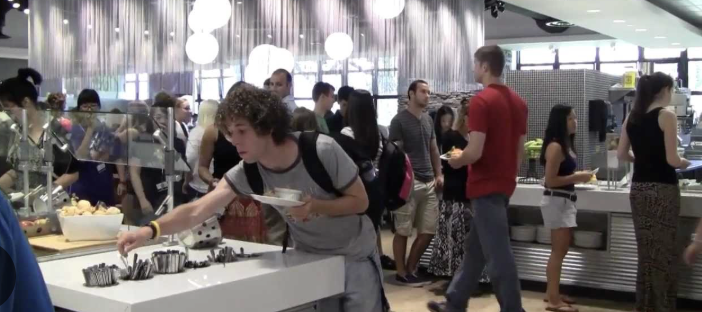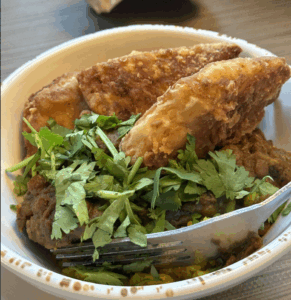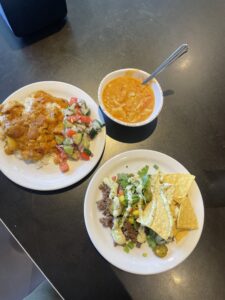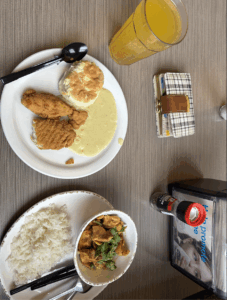The first week of college, I found myself standing in the middle of the dining hall, plates in hand, and overwhelmed by abundance – at that time, I mislabeled it as social awkwardness. Rows of steaming trays (and some cold) lined up on the counters unclaimed, the air filled with the mixed aromas of pasta, pizza, and something vaguely spicy that claimed to be “international cuisine.” I recognized half the dishes, while the other half were a mystery – and I love mysteries and surprises. So, I took everything offered to me by the kind servers. Newly arrived and far from home, I didn’t want to seem ungrateful or worse, “difficult;” and I think I still struggle with this time to time. So, I smiled and accepted whatever the server offered, while only requesting oregano (an herb they had to grab from the back and not normally served upfront then) to be added to my pasta, even when I knew I wouldn’t be able to finish it. Back then, I thought being agreeable was the same as being adaptable; you know “going with the flow.” But as I sat down and stared at a table full of things I didn’t really want, I realized that I had confused politeness with silence; a habit that, in many ways, followed me across cultures.
Food as a Mirror of Comfort and Culture
I grew up in cultures where food is respected to the point where you are one step away from worshipping it. Because at the end of the day, it is the very blessing that some have to their luxury, to test their gratefulness and restraint; whereas others have to go through life-threatening hurdles for it, to test their patience and capacity. In these cultures, refusing food could be seen as impolite, even disrespectful. The table itself is quite an intimate space of care, generosity, and love because food isn’t just sustenance for us, it’s a language of affection. To eat food given by others is to acknowledge their hard work, and the time and affection that went in to make it. And so I learned early on to take what was offered, no questions asked – because as the person who did not cook it, we are not to assume nor underestimate the struggle that went into it. But in that first week of going to dining halls, I realized something quite subtle: here, I was no longer the guest. It was my home for 4 years and I had to learn how to feed myself; not just with food, but with choice.
Over time, I began to notice how that same pattern played out beyond the dining hall. I said yes to clubs I wasn’t passionate about, to social events and friends that drained me, to conversations where I felt the need to agree just to belong. It’s strange how standing in a dining hall line can mirror life in the most weirdest way possible: the way we move along, trying to fit in, piling things onto our plates without asking whether they truly fulfill us. It definitely took a little time and one too many wasted meals, to start changing this. I remember one day when I finally said, “No, thank you,” to a part of the dish I knew I wouldn’t eat. It was even more entertaining because the the servers tend to double check with you – and sometime insist that you take it. Can’t blame them either – after all, the food that remains towards the end of the day, ends up getting tossed out. It was such a small moment, but for me, it carried a quiet kind of liberation that I did not even notice until this year; my last year on campus. It reminded me that voicing my preferences didn’t make me ungrateful or disrespectful; it just made me genuine and truthful to myself and by an extension, to my social environment.
Learning to choose wasn’t just about asserting independence because it was also about understanding comfort – understanding yourself.
The Other Side of the Dining Hall
Sometimes, I would freeze in horror when I near the disposing station because of how much food went untouched, yet thrown out. The sight poked me in the wrong way reflectively. Perhaps I think too much; but so much of what ends up wasted in the dining hall mirrors what we waste in life: time spent doing things we don’t care about, energy poured into pleasing others or struggling to say no, and effort devoted to things that don’t serve our growth or purpose.
At first, I only did see the wasted food: the untouched vegetables, the cold burgers, the half eaten fries, etc. and I thought, “Oh, that’s too bad. Sad, but nothing much I can do.” But the more I looked – actually the more I overthought – the more I saw stories of first-years, and possibly some second years as well, who didn’t yet know what they liked and/or they knew, but could not refuse what they did not like. By an extension, it was a reflection of myself. Thanks to my behavioral psychology and emotional developmental courses, I came to a sudden realization that food waste isn’t as simple as just an environmental issue because depending on your perspective, it’s a psychological one. It’s about awareness or the lack thereof.
When we don’t know ourselves or we refuse to accept parts of our autonomy that essentially goes against current trends or the unanimous group vibes, we consume mindlessly. When we’re unsure of what we need, we either take more than we can handle, or none at all, leaving it to just “going with the flow,” whether that’s in food, in work, in relationships, etc. It’s a peculiar angle, but the dining hall became a mirror for that realization. Amongst the multiple global humanitarian crisis that everyone of us are aware of, but barely gets any honest media attention or help, this angle was sort of a push that I needed. So now, when I walk through the stations, I take smaller portions. I ask for what I know I’ll finish. I take a second serving only when I’m certain that I want the item. It’s not just about reducing waste and I could not keep existing in the headspace of “Oh, it’s just me only who does this, so how will it make a difference?” The thing is, you need to stop comparing yourself to a world full of 8 billion people and focus more on yourself and the world you are building around you, even if it is one plate at a time. Because self-awareness is not something you gain overnight; It’s something you practice consistently, even in the simplest acts, like deciding what goes on your plate.
Beyond the Plate
I think we genuinely underestimate the influence our surroundings have on us. Even if we know we will not eat something, we will end up taking it anyway, either due to “following the crowd [the literal line],” or our way of showing politeness to the servers. While the former needs effort from your end, the latter I admire; though I fail to see how being polite and taking food you do not want and having the servers refill it, therefore making more food to distribute and increasing to the overall waste, is kindness.
When I began to see my surroundings as such and asking questions like that, I realized that the dining hall wasn’t just a place to eat; it was a microcosm of choice, culture, and consciousness, if you will. I started noticing who sat together, how they interacted to one another, how students with dietary restrictions navigated their meals, how international students hesitated before trying something unfamiliar and most of all, how I developed the courage to sit at a table by myself. I saw how something so simple, like food, could reveal such a complexity of belonging and identity. Over time, my plate became less about consuming and more about just enjoying the moment of rest and choice. Less about fitting in, and more about feeling full and not just in stomach, but in the soul as well. Biologically, taking your time and eating slower also helps you digest better and feel fuller – so, one plate at a time. As a third-culture student, this transformation almost felt symbolic. I was learning not just how to eat selectively, but how to live differently – on my own, blending the collectivism I grew up with and another stage of independence I was learning here. That is to say “no” when necessary, without the complimentary guilt and to say “yes” when something truly resonated and is relevant to my goal(s).
To those still wondering what this is about, understand that college will offer you countless of buffets – not just of food, but of ideas, friendships, opportunities, and paths. You’ll be encouraged to take it all or nothing, and to be everything at once or be delusional; it’s almost always going to be just extremes and no middle ground. But you know what? It’s okay to choose carefully – to say no and to pause and ask what truly feeds you; to shelf and choose to not negate what you do not understand yet and what is beyond you.
So the next time when you walk into a dining hall, take a deep breath and look around; choose what you want, take your time to savor it and get nothing more, until you finish that plate and you check in with yourself to see if you’re still hungry. Because confidence, in its quietest form, is self-awareness and self-awareness, in the end, is what truly nourishes you. You don’t have to pile everything onto your plate nor do you have to pair the given items the way it is paired – you can refuse what you do not want, you can combine food from different sections to fulfill your palette and moreover, you can even speak to hardworking servers and cooks and communicate your take on a certain dish. You do not have to choose one or the other extreme. Sometimes, fulfillment begins with leaving space to grow and with you creating your own middle ground.





